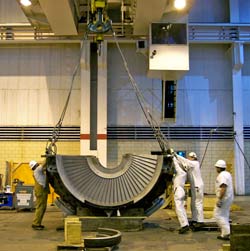So you’ve decided you want to work in heavy industry, specifically with cranes, but where do you begin? To help you make informed choices, and start you on the way to a fulfilling career, we’ll briefly review the crane industry’s primary career paths and the specific education, training, and experience required for each.
Crane operator
 Most crane operators working in construction or manufacturing today enter their careers through an apprenticeship program, such as those offered by the Associated General Contractors of America (AGCA) and the International Union of Operating Engineers (IUOE). Much of the actual training occurs on the job and focuses on safety (including compliance with OSHA regulations), communication between operators and other workers, and of course equipment operation. Several private training schools also offer educational programs leading to licensing and certification. State licensure requirements vary but typically involve both a written and practical skills test. Employers may also require operators to have professional certification, as provided by the National Commission for the Certification of Crane Operators (NCCCO). NCCCO recertification is required at 5-year intervals to ensure that operators remain current with the latest equipment and safety regulations. Recertification also requires a passing exam grade and proof of 1000 hours of crane operation during the prior 5-year period. Careerbuilder.com estimates annual salaries of $36,000 (starting) and $45,000 (average) for crane operators in the U.S.
Most crane operators working in construction or manufacturing today enter their careers through an apprenticeship program, such as those offered by the Associated General Contractors of America (AGCA) and the International Union of Operating Engineers (IUOE). Much of the actual training occurs on the job and focuses on safety (including compliance with OSHA regulations), communication between operators and other workers, and of course equipment operation. Several private training schools also offer educational programs leading to licensing and certification. State licensure requirements vary but typically involve both a written and practical skills test. Employers may also require operators to have professional certification, as provided by the National Commission for the Certification of Crane Operators (NCCCO). NCCCO recertification is required at 5-year intervals to ensure that operators remain current with the latest equipment and safety regulations. Recertification also requires a passing exam grade and proof of 1000 hours of crane operation during the prior 5-year period. Careerbuilder.com estimates annual salaries of $36,000 (starting) and $45,000 (average) for crane operators in the U.S.
Safety engineer/advisor
Safety engineers are in demand in the industrial, manufacturing, mining, transportation, and construction arenas and are responsible for identifying and minimizing risk in the workplace as well as for ensuring compliance with OSHA regulations and industry standards. Safety engineers identify risks in both equipment and procedures and work to create solutions that reduce the chances for worker injury, equipment failure, and damage. The position typically requires a bachelor’s degree in science or engineering, most often through a 4-year program. Specialty degrees in safety management and occupational safety and health are also offered by some educational institutions. The American Society of Safety Engineers (www.asse.org) is a good place to begin your search for schools offering degree programs in the field. A typical annual salary for a degreed safety engineer is currently about $75,000.
Crane Inspector
Crane inspectors are the principal line of defense against accidents. They are responsible for the detection of any damage, defects, or risk factors that may pose a risk in crane operation, as well as for ensuring that all equipment meets OSHA regulations and industry standards. Duties include visual and operational inspection of booms, gears, drums, sheaves, blocks, hooks, rigging, hydraulics, as well as load testing, interpretation of load test results, and proper record keeping. Inspectors also ensure that standards for regular maintenance and care of equipment are met. Several educational institutions provide career training and certification. The NCCCO (www.nccco.org) instituted a specific crane inspector certification program in 2011. Annual salaries range by region but are typically between $35,000 and $50,000.
Crane buyer/purchasing agent
A purchasing agent is responsible for controlling expenditures and maximizing value. In the crane industry, that means choosing the appropriate equipment for the job while maximizing productivity, ensuring quality, minimizing costs, complying with safety regulations, and reducing redundancy. Duties also include supervising the transport, storage, and maintenance of all procured equipment, as well as keeping careful track of all transactions and documentation, including invoicing. Typically a purchasing agent will have a bachelor’s degree in business administration earned through a 4-year program. Larger corporations may require a master’s degree. The Bureau of Labor Statistics estimates annual earnings for purchasing agents were between $39,000 and $66,000 for 2011.
Crane salesperson/industrial sales
Industrial sales representatives are responsible for cultivating and maintaining the client relationships that generate revenue and promote repeat business. Identifying prospective clients, providing information, answering questions, building rapport, and ensuring customer satisfaction are all important duties of the sales representative in the crane industry. The position also demands accurate record-keeping, maintaining sales reports, and assessing the competitive position of the company’s products. Educational requirements vary and depending on the position, may require a degree or experience in either marketing or engineering. The primary requirement, however, is the ability to connect with people. There is no substitute for solid interpersonal skills, and the sales representative is the company’s public face, its connection to its clients, and its chief revenue generator. Salary and commission structures vary, but the average annual compensation for the position is around $65,000.
Crane engineer
There are many engineering career paths in the crane industry—from mechanical, structural, and electrical engineer to project, field, and sales engineer. In the crane industry, mechanical, electrical, and structural engineers are most often involved in the design and product development arenas, creating products that are both durable and versatile, powerful and practical, state-of-the-art and user-friendly. While terms such as mechanical and electrical engineer are self-explanatory, those such as field engineer can involve varying responsibilities. Field engineers in the crane industry typically oversee the installation, construction, or assembly of equipment on site. Project engineers typically straddle the boundary between engineering and project management—including budgeting, scheduling, planning, and interpreting design instructions. Sales engineers help clients match their needs and their facility’s specifications with the company’s products and services. In all cases a degree in engineering is required. Depending on the position, a subspecialty certification such as electrical engineering may also be required. The Bureau of Labor Statistics reports the average annual salary for mechanical engineers to be $78,000; for electrical engineers to be $89,000; for sales engineers to be $87,000; and for project engineers/construction managers to be $83,000.
Quality assurance managerMaintaining quality standards is essential to any manufacturer. In the crane industry, that means inspecting products and materials for any signs of defect or deviation from the manufacturer’s prescribed standards. Quality assurance managers (or quality control inspectors) typically train on the job, as each employer will have specific criteria and requirements for its products. A high school diploma or GED is often sufficient. A successful inspector has a keen sense for identifying damage, defect, or substandard materials, and is also responsible for maintaining accurate records and documentation. According to the Bureau of Labor Statistics, annual salaries for the position average around $33,000.
This post was contributed by SPANCO, a leading overhead crane company. They offer products such as jib cranes, gantry cranes, monorail cranes, and much more.


COMMENTS